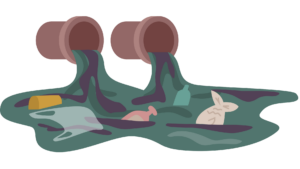As we approach the festive season, it is worth looking carefully at the grease problem, i.e. the effects of kitchen fats, oils and grease on drainage systems. In this article, we will look at the consequences of the FOG (fat, oil, animal fat) problem at international level and its economic and environmental impact.
The core of the FOG problem: fat challenges in drains
FOG problems are not just pipe blockages, but affect sewerage systems in many different ways. Fats congeal in sewers, creating a barrier that not only interferes with the flow of pipes but also creates wider ecological problems downstream.
Source and impact: from industry to households
FOG waste is generated from many sources, including industry, commercial properties and households. Industrial processes produce large amounts of grease, which ends up in sewage systems, affecting wastewater treatment and increasing maintenance costs. Commercial properties, such as restaurants, are a major source of FOG, and fat from domestic sources is particularly prominent during festive periods when food is the focus.
Examples from around the world:
- In Helsinki, around 40 tonnes of grease are removed from sewers every month, which significantly reduces the performance of the pipelines. The annual costs of cleaning and transport fall on the wallets of city dwellers. (Helsinki Region Environmental Services HSY)
- In San Francisco, more than 2,600 restaurants pay $3.5 million annually to manage FOG waste problems, demonstrating the scale of the challenges facing commercial properties. In San Francisco, more than 6,000 FOG alarms are generated annually in a relatively small area. (Municipal Sewer & Water)
- In the UK, food service establishments such as bars, fast food restaurants and hospitals produce thousands of kilos of FOG every year, adding to the environmental and economic challenges. In the city of Nottingham, it costs £450 000 a year to clear blockages – a bill that is always paid by customers. In the wider Midlands region, more than 20,000 blocked drains were treated in 2022 at a cost of up to £6 million. (Nottingham Post)
- In Melbourne, Australia, it is estimated that around 30% of sewer blockages are caused by FOG and that 80% of FOG comes from commercial farms (South East Water Limited)
Households and the fat problems of the festive season
In addition to commercial premises, households are a significant source of FOG, especially on festive days such as Christmas. All too often, greasy waste from the Christmas table, especially cooking fats, ends up in the sewer. However, campaigns and public debate have had a positive impact on reducing the problem, and cooking glass is now being used as a fuel in Finland. More and more cooking fats are now being properly treated at recycling points. Up to 55% of sewer blockages are caused by incorrect disposal of cooking fat. In Canada, for example, the amount of FOG from households in the British Columbia metropolitan area (around 300 000 people) was close to 1 million kilograms per year in 2013, and this figure is likely to have increased as population and consumption have grown.
Solutions and proactive action
There are solutions to the FOG problem. One effective method is the pre-treatment of wastewater with grease traps and filters in commercial buildings. Our company, SmartPipe, offers innovative microbiological solutions that keep pipes clean and prevent FOG problems. Our BioTroop solutions for different applications are suitable for solving a wide range of plumbing problems.
In addition, we have registered the concept of a grease footprint to raise awareness of the challenges associated with wastewater and to encourage people and businesses to adopt the right practices.
Summary: Multifaceted management of the FOG problem
The global economic and environmental impact of lipid problems is significant. By focusing on prevention and sustainable solutions, we can manage FOG effectively. You can be part of the solution, for example by recycling your kitchen grease correctly and supporting environmentally friendly practices.
Check out our plumbing products here.

